The Impact of Ethics on Managerial Decision-Making (MGMT101)
VerifiedAdded on 2021/06/15
|16
|4377
|28
Essay
AI Summary
This essay examines the critical role of ethical decision-making in management and its impact on overall effectiveness. The introduction highlights the importance of ethical behavior, integrity, and moral leadership in organizational contexts. The literature review explores the relationship between ethical decision-making and effective management practices, essential skills and capabilities for promoting ethical choices, and how personality traits influence these decisions. The essay then analyzes the results of the Big Five Inventory, Thomas-Kilmann Conflict Mode Instrument, and Learning Style Questionnaire to assess the author's personality and decision-making tendencies. The essay concludes with a detailed action plan based on the SMART goal framework, outlining specific goals and strategies for enhancing ethical conduct within a management context. This comprehensive analysis provides insights into fostering ethical practices and promoting responsible leadership within organizations.
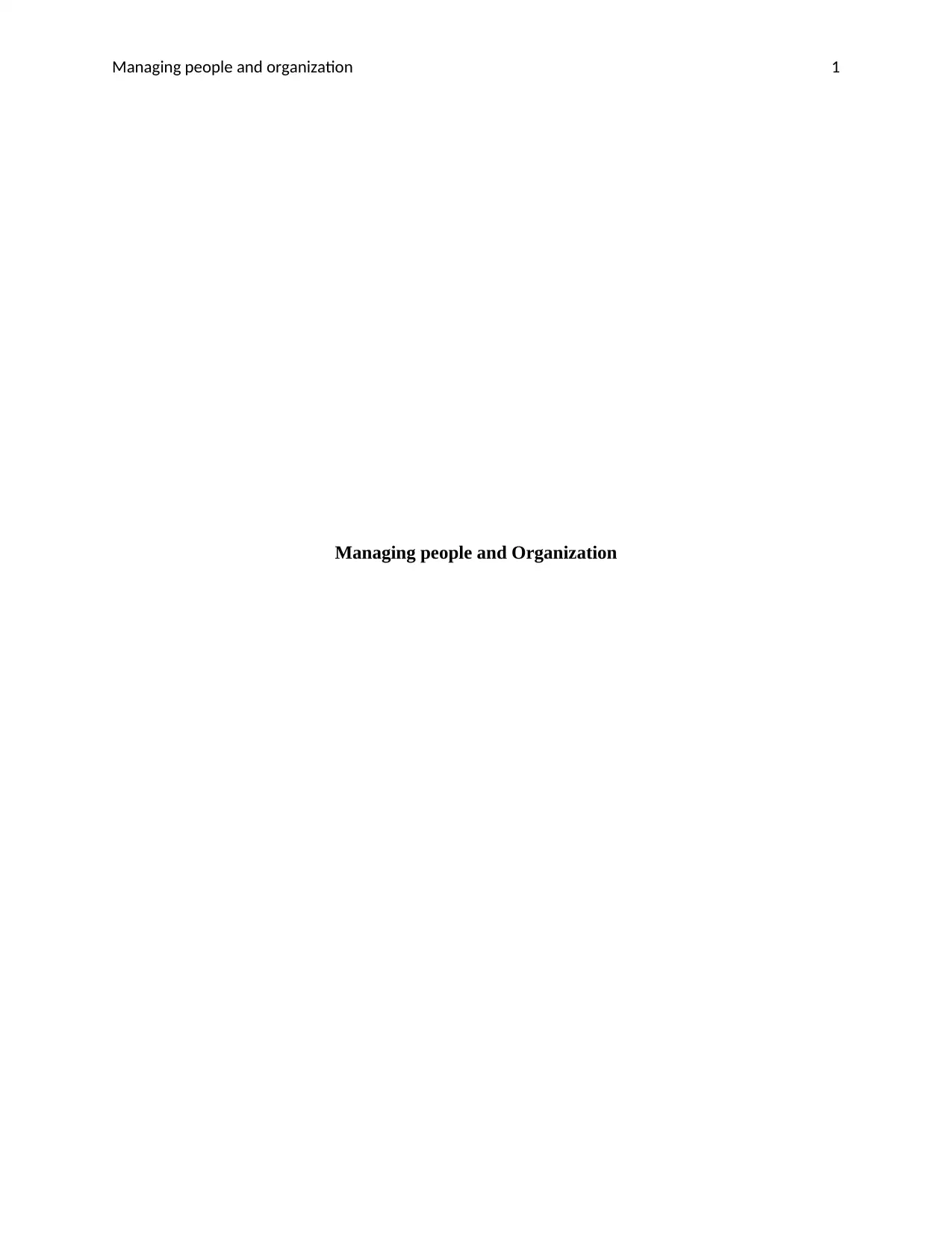
Managing people and organization 1
Managing people and Organization
Managing people and Organization
Paraphrase This Document
Need a fresh take? Get an instant paraphrase of this document with our AI Paraphraser
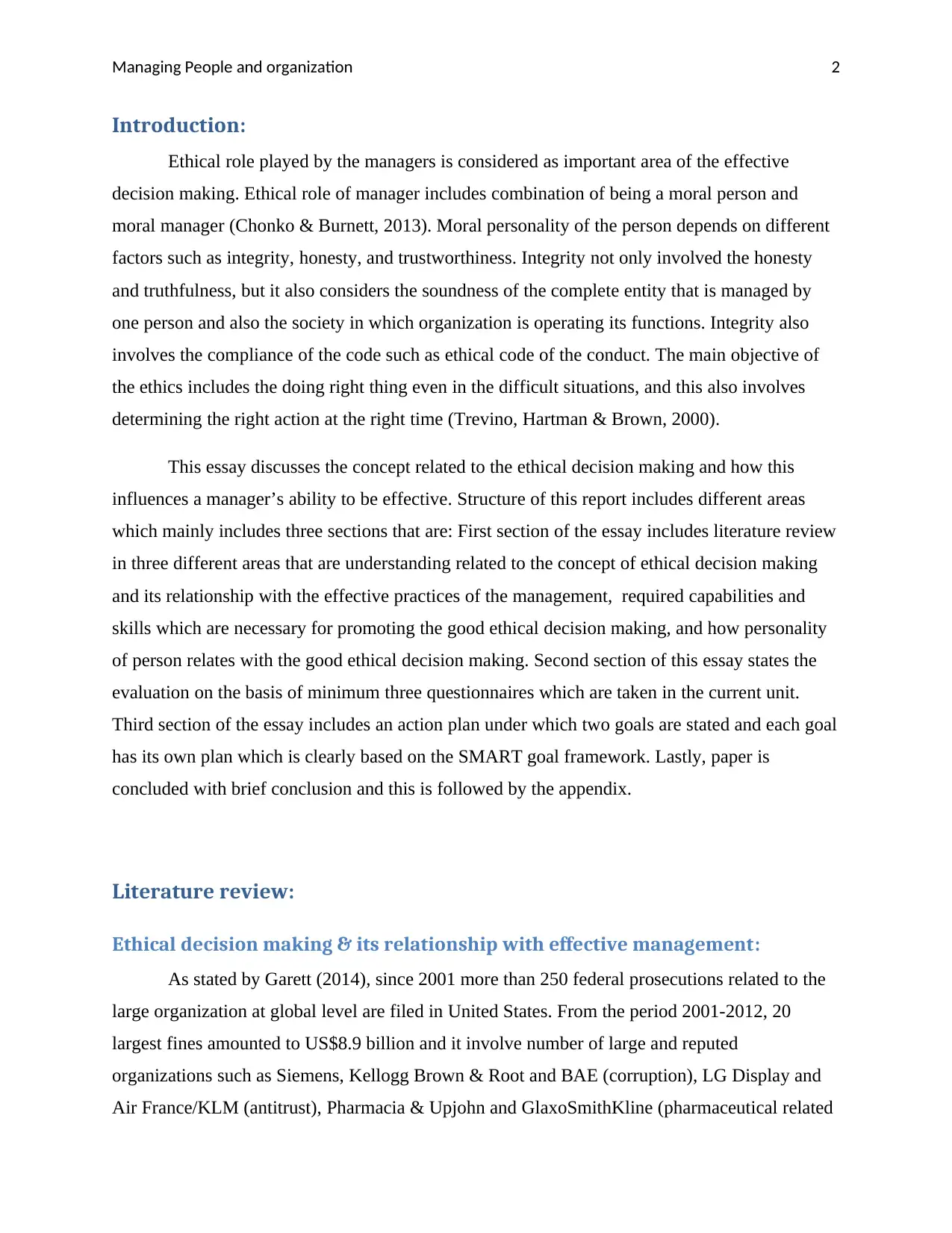
Managing People and organization 2
Introduction:
Ethical role played by the managers is considered as important area of the effective
decision making. Ethical role of manager includes combination of being a moral person and
moral manager (Chonko & Burnett, 2013). Moral personality of the person depends on different
factors such as integrity, honesty, and trustworthiness. Integrity not only involved the honesty
and truthfulness, but it also considers the soundness of the complete entity that is managed by
one person and also the society in which organization is operating its functions. Integrity also
involves the compliance of the code such as ethical code of the conduct. The main objective of
the ethics includes the doing right thing even in the difficult situations, and this also involves
determining the right action at the right time (Trevino, Hartman & Brown, 2000).
This essay discusses the concept related to the ethical decision making and how this
influences a manager’s ability to be effective. Structure of this report includes different areas
which mainly includes three sections that are: First section of the essay includes literature review
in three different areas that are understanding related to the concept of ethical decision making
and its relationship with the effective practices of the management, required capabilities and
skills which are necessary for promoting the good ethical decision making, and how personality
of person relates with the good ethical decision making. Second section of this essay states the
evaluation on the basis of minimum three questionnaires which are taken in the current unit.
Third section of the essay includes an action plan under which two goals are stated and each goal
has its own plan which is clearly based on the SMART goal framework. Lastly, paper is
concluded with brief conclusion and this is followed by the appendix.
Literature review:
Ethical decision making & its relationship with effective management:
As stated by Garett (2014), since 2001 more than 250 federal prosecutions related to the
large organization at global level are filed in United States. From the period 2001-2012, 20
largest fines amounted to US$8.9 billion and it involve number of large and reputed
organizations such as Siemens, Kellogg Brown & Root and BAE (corruption), LG Display and
Air France/KLM (antitrust), Pharmacia & Upjohn and GlaxoSmithKline (pharmaceutical related
Introduction:
Ethical role played by the managers is considered as important area of the effective
decision making. Ethical role of manager includes combination of being a moral person and
moral manager (Chonko & Burnett, 2013). Moral personality of the person depends on different
factors such as integrity, honesty, and trustworthiness. Integrity not only involved the honesty
and truthfulness, but it also considers the soundness of the complete entity that is managed by
one person and also the society in which organization is operating its functions. Integrity also
involves the compliance of the code such as ethical code of the conduct. The main objective of
the ethics includes the doing right thing even in the difficult situations, and this also involves
determining the right action at the right time (Trevino, Hartman & Brown, 2000).
This essay discusses the concept related to the ethical decision making and how this
influences a manager’s ability to be effective. Structure of this report includes different areas
which mainly includes three sections that are: First section of the essay includes literature review
in three different areas that are understanding related to the concept of ethical decision making
and its relationship with the effective practices of the management, required capabilities and
skills which are necessary for promoting the good ethical decision making, and how personality
of person relates with the good ethical decision making. Second section of this essay states the
evaluation on the basis of minimum three questionnaires which are taken in the current unit.
Third section of the essay includes an action plan under which two goals are stated and each goal
has its own plan which is clearly based on the SMART goal framework. Lastly, paper is
concluded with brief conclusion and this is followed by the appendix.
Literature review:
Ethical decision making & its relationship with effective management:
As stated by Garett (2014), since 2001 more than 250 federal prosecutions related to the
large organization at global level are filed in United States. From the period 2001-2012, 20
largest fines amounted to US$8.9 billion and it involve number of large and reputed
organizations such as Siemens, Kellogg Brown & Root and BAE (corruption), LG Display and
Air France/KLM (antitrust), Pharmacia & Upjohn and GlaxoSmithKline (pharmaceutical related
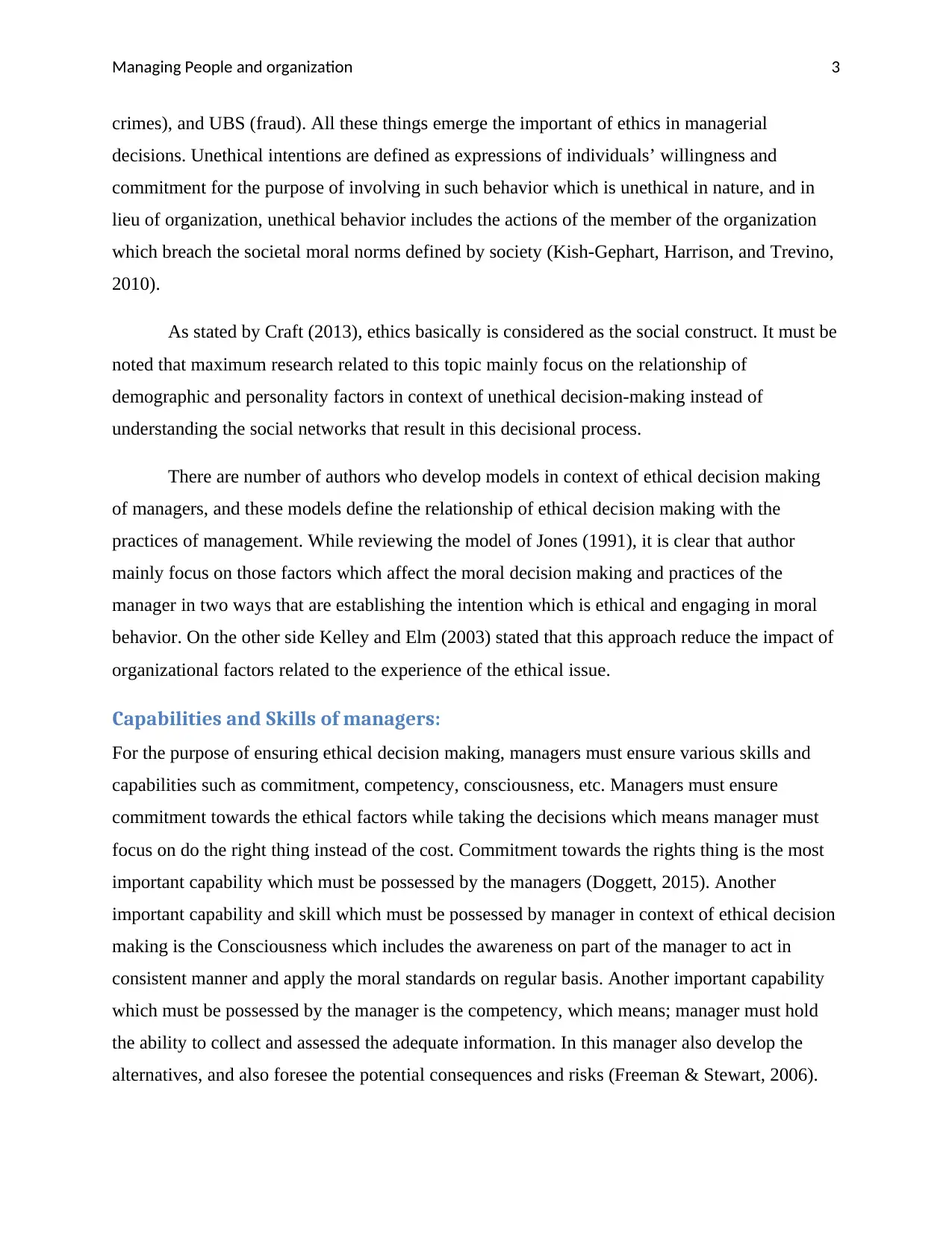
Managing People and organization 3
crimes), and UBS (fraud). All these things emerge the important of ethics in managerial
decisions. Unethical intentions are defined as expressions of individuals’ willingness and
commitment for the purpose of involving in such behavior which is unethical in nature, and in
lieu of organization, unethical behavior includes the actions of the member of the organization
which breach the societal moral norms defined by society (Kish-Gephart, Harrison, and Trevino,
2010).
As stated by Craft (2013), ethics basically is considered as the social construct. It must be
noted that maximum research related to this topic mainly focus on the relationship of
demographic and personality factors in context of unethical decision-making instead of
understanding the social networks that result in this decisional process.
There are number of authors who develop models in context of ethical decision making
of managers, and these models define the relationship of ethical decision making with the
practices of management. While reviewing the model of Jones (1991), it is clear that author
mainly focus on those factors which affect the moral decision making and practices of the
manager in two ways that are establishing the intention which is ethical and engaging in moral
behavior. On the other side Kelley and Elm (2003) stated that this approach reduce the impact of
organizational factors related to the experience of the ethical issue.
Capabilities and Skills of managers:
For the purpose of ensuring ethical decision making, managers must ensure various skills and
capabilities such as commitment, competency, consciousness, etc. Managers must ensure
commitment towards the ethical factors while taking the decisions which means manager must
focus on do the right thing instead of the cost. Commitment towards the rights thing is the most
important capability which must be possessed by the managers (Doggett, 2015). Another
important capability and skill which must be possessed by manager in context of ethical decision
making is the Consciousness which includes the awareness on part of the manager to act in
consistent manner and apply the moral standards on regular basis. Another important capability
which must be possessed by the manager is the competency, which means; manager must hold
the ability to collect and assessed the adequate information. In this manager also develop the
alternatives, and also foresee the potential consequences and risks (Freeman & Stewart, 2006).
crimes), and UBS (fraud). All these things emerge the important of ethics in managerial
decisions. Unethical intentions are defined as expressions of individuals’ willingness and
commitment for the purpose of involving in such behavior which is unethical in nature, and in
lieu of organization, unethical behavior includes the actions of the member of the organization
which breach the societal moral norms defined by society (Kish-Gephart, Harrison, and Trevino,
2010).
As stated by Craft (2013), ethics basically is considered as the social construct. It must be
noted that maximum research related to this topic mainly focus on the relationship of
demographic and personality factors in context of unethical decision-making instead of
understanding the social networks that result in this decisional process.
There are number of authors who develop models in context of ethical decision making
of managers, and these models define the relationship of ethical decision making with the
practices of management. While reviewing the model of Jones (1991), it is clear that author
mainly focus on those factors which affect the moral decision making and practices of the
manager in two ways that are establishing the intention which is ethical and engaging in moral
behavior. On the other side Kelley and Elm (2003) stated that this approach reduce the impact of
organizational factors related to the experience of the ethical issue.
Capabilities and Skills of managers:
For the purpose of ensuring ethical decision making, managers must ensure various skills and
capabilities such as commitment, competency, consciousness, etc. Managers must ensure
commitment towards the ethical factors while taking the decisions which means manager must
focus on do the right thing instead of the cost. Commitment towards the rights thing is the most
important capability which must be possessed by the managers (Doggett, 2015). Another
important capability and skill which must be possessed by manager in context of ethical decision
making is the Consciousness which includes the awareness on part of the manager to act in
consistent manner and apply the moral standards on regular basis. Another important capability
which must be possessed by the manager is the competency, which means; manager must hold
the ability to collect and assessed the adequate information. In this manager also develop the
alternatives, and also foresee the potential consequences and risks (Freeman & Stewart, 2006).
⊘ This is a preview!⊘
Do you want full access?
Subscribe today to unlock all pages.

Trusted by 1+ million students worldwide
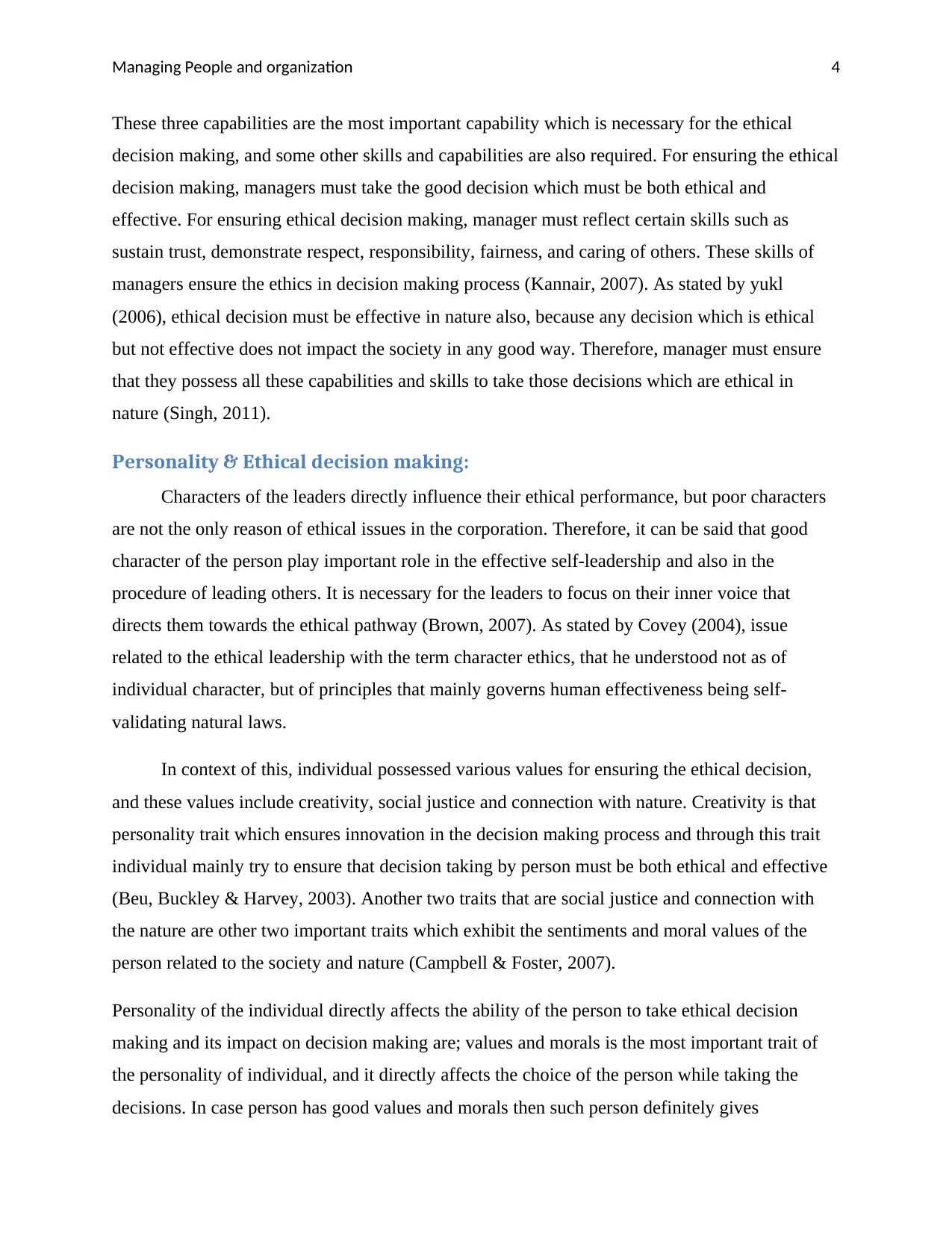
Managing People and organization 4
These three capabilities are the most important capability which is necessary for the ethical
decision making, and some other skills and capabilities are also required. For ensuring the ethical
decision making, managers must take the good decision which must be both ethical and
effective. For ensuring ethical decision making, manager must reflect certain skills such as
sustain trust, demonstrate respect, responsibility, fairness, and caring of others. These skills of
managers ensure the ethics in decision making process (Kannair, 2007). As stated by yukl
(2006), ethical decision must be effective in nature also, because any decision which is ethical
but not effective does not impact the society in any good way. Therefore, manager must ensure
that they possess all these capabilities and skills to take those decisions which are ethical in
nature (Singh, 2011).
Personality & Ethical decision making:
Characters of the leaders directly influence their ethical performance, but poor characters
are not the only reason of ethical issues in the corporation. Therefore, it can be said that good
character of the person play important role in the effective self-leadership and also in the
procedure of leading others. It is necessary for the leaders to focus on their inner voice that
directs them towards the ethical pathway (Brown, 2007). As stated by Covey (2004), issue
related to the ethical leadership with the term character ethics, that he understood not as of
individual character, but of principles that mainly governs human effectiveness being self-
validating natural laws.
In context of this, individual possessed various values for ensuring the ethical decision,
and these values include creativity, social justice and connection with nature. Creativity is that
personality trait which ensures innovation in the decision making process and through this trait
individual mainly try to ensure that decision taking by person must be both ethical and effective
(Beu, Buckley & Harvey, 2003). Another two traits that are social justice and connection with
the nature are other two important traits which exhibit the sentiments and moral values of the
person related to the society and nature (Campbell & Foster, 2007).
Personality of the individual directly affects the ability of the person to take ethical decision
making and its impact on decision making are; values and morals is the most important trait of
the personality of individual, and it directly affects the choice of the person while taking the
decisions. In case person has good values and morals then such person definitely gives
These three capabilities are the most important capability which is necessary for the ethical
decision making, and some other skills and capabilities are also required. For ensuring the ethical
decision making, managers must take the good decision which must be both ethical and
effective. For ensuring ethical decision making, manager must reflect certain skills such as
sustain trust, demonstrate respect, responsibility, fairness, and caring of others. These skills of
managers ensure the ethics in decision making process (Kannair, 2007). As stated by yukl
(2006), ethical decision must be effective in nature also, because any decision which is ethical
but not effective does not impact the society in any good way. Therefore, manager must ensure
that they possess all these capabilities and skills to take those decisions which are ethical in
nature (Singh, 2011).
Personality & Ethical decision making:
Characters of the leaders directly influence their ethical performance, but poor characters
are not the only reason of ethical issues in the corporation. Therefore, it can be said that good
character of the person play important role in the effective self-leadership and also in the
procedure of leading others. It is necessary for the leaders to focus on their inner voice that
directs them towards the ethical pathway (Brown, 2007). As stated by Covey (2004), issue
related to the ethical leadership with the term character ethics, that he understood not as of
individual character, but of principles that mainly governs human effectiveness being self-
validating natural laws.
In context of this, individual possessed various values for ensuring the ethical decision,
and these values include creativity, social justice and connection with nature. Creativity is that
personality trait which ensures innovation in the decision making process and through this trait
individual mainly try to ensure that decision taking by person must be both ethical and effective
(Beu, Buckley & Harvey, 2003). Another two traits that are social justice and connection with
the nature are other two important traits which exhibit the sentiments and moral values of the
person related to the society and nature (Campbell & Foster, 2007).
Personality of the individual directly affects the ability of the person to take ethical decision
making and its impact on decision making are; values and morals is the most important trait of
the personality of individual, and it directly affects the choice of the person while taking the
decisions. In case person has good values and morals then such person definitely gives
Paraphrase This Document
Need a fresh take? Get an instant paraphrase of this document with our AI Paraphraser
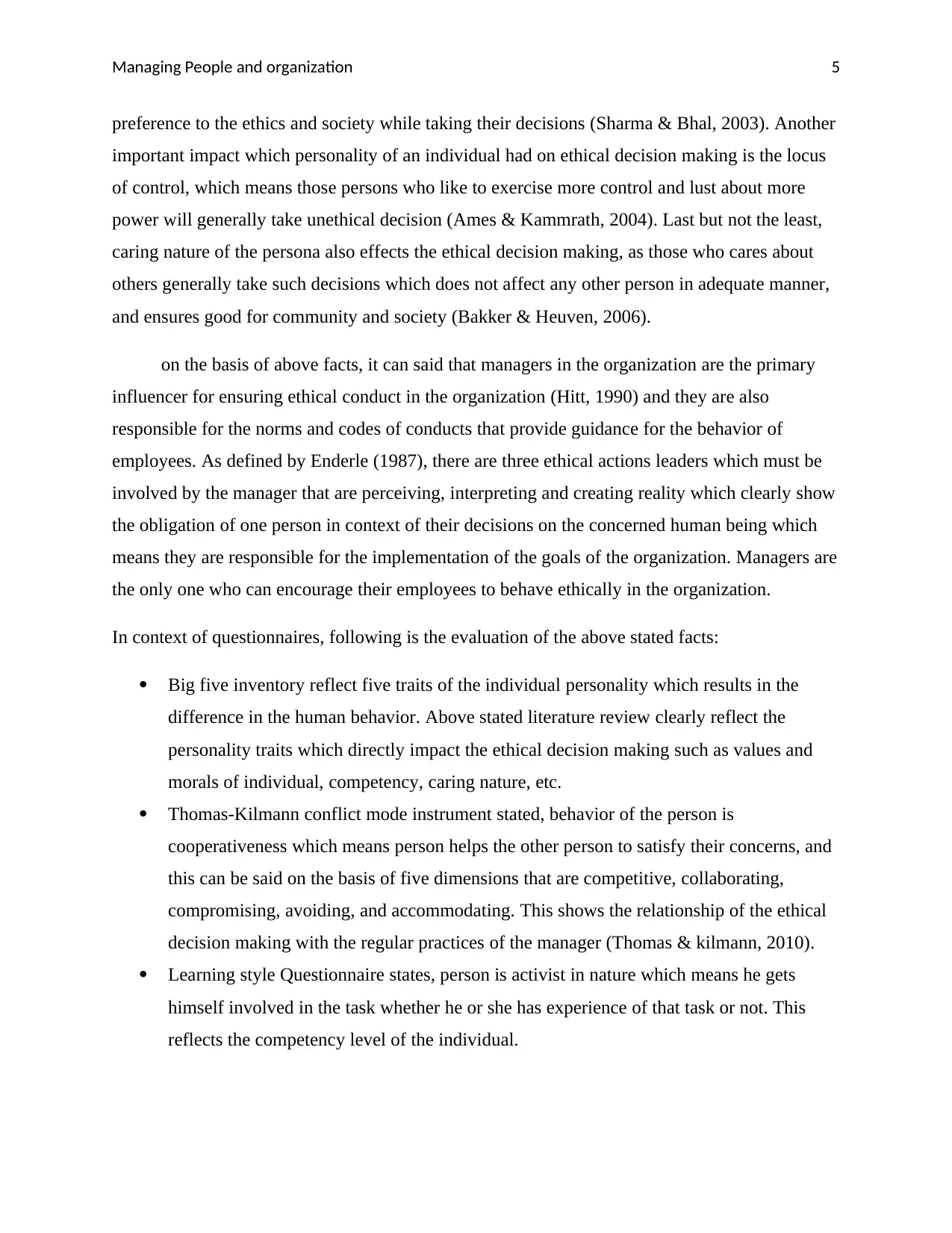
Managing People and organization 5
preference to the ethics and society while taking their decisions (Sharma & Bhal, 2003). Another
important impact which personality of an individual had on ethical decision making is the locus
of control, which means those persons who like to exercise more control and lust about more
power will generally take unethical decision (Ames & Kammrath, 2004). Last but not the least,
caring nature of the persona also effects the ethical decision making, as those who cares about
others generally take such decisions which does not affect any other person in adequate manner,
and ensures good for community and society (Bakker & Heuven, 2006).
on the basis of above facts, it can said that managers in the organization are the primary
influencer for ensuring ethical conduct in the organization (Hitt, 1990) and they are also
responsible for the norms and codes of conducts that provide guidance for the behavior of
employees. As defined by Enderle (1987), there are three ethical actions leaders which must be
involved by the manager that are perceiving, interpreting and creating reality which clearly show
the obligation of one person in context of their decisions on the concerned human being which
means they are responsible for the implementation of the goals of the organization. Managers are
the only one who can encourage their employees to behave ethically in the organization.
In context of questionnaires, following is the evaluation of the above stated facts:
Big five inventory reflect five traits of the individual personality which results in the
difference in the human behavior. Above stated literature review clearly reflect the
personality traits which directly impact the ethical decision making such as values and
morals of individual, competency, caring nature, etc.
Thomas-Kilmann conflict mode instrument stated, behavior of the person is
cooperativeness which means person helps the other person to satisfy their concerns, and
this can be said on the basis of five dimensions that are competitive, collaborating,
compromising, avoiding, and accommodating. This shows the relationship of the ethical
decision making with the regular practices of the manager (Thomas & kilmann, 2010).
Learning style Questionnaire states, person is activist in nature which means he gets
himself involved in the task whether he or she has experience of that task or not. This
reflects the competency level of the individual.
preference to the ethics and society while taking their decisions (Sharma & Bhal, 2003). Another
important impact which personality of an individual had on ethical decision making is the locus
of control, which means those persons who like to exercise more control and lust about more
power will generally take unethical decision (Ames & Kammrath, 2004). Last but not the least,
caring nature of the persona also effects the ethical decision making, as those who cares about
others generally take such decisions which does not affect any other person in adequate manner,
and ensures good for community and society (Bakker & Heuven, 2006).
on the basis of above facts, it can said that managers in the organization are the primary
influencer for ensuring ethical conduct in the organization (Hitt, 1990) and they are also
responsible for the norms and codes of conducts that provide guidance for the behavior of
employees. As defined by Enderle (1987), there are three ethical actions leaders which must be
involved by the manager that are perceiving, interpreting and creating reality which clearly show
the obligation of one person in context of their decisions on the concerned human being which
means they are responsible for the implementation of the goals of the organization. Managers are
the only one who can encourage their employees to behave ethically in the organization.
In context of questionnaires, following is the evaluation of the above stated facts:
Big five inventory reflect five traits of the individual personality which results in the
difference in the human behavior. Above stated literature review clearly reflect the
personality traits which directly impact the ethical decision making such as values and
morals of individual, competency, caring nature, etc.
Thomas-Kilmann conflict mode instrument stated, behavior of the person is
cooperativeness which means person helps the other person to satisfy their concerns, and
this can be said on the basis of five dimensions that are competitive, collaborating,
compromising, avoiding, and accommodating. This shows the relationship of the ethical
decision making with the regular practices of the manager (Thomas & kilmann, 2010).
Learning style Questionnaire states, person is activist in nature which means he gets
himself involved in the task whether he or she has experience of that task or not. This
reflects the competency level of the individual.
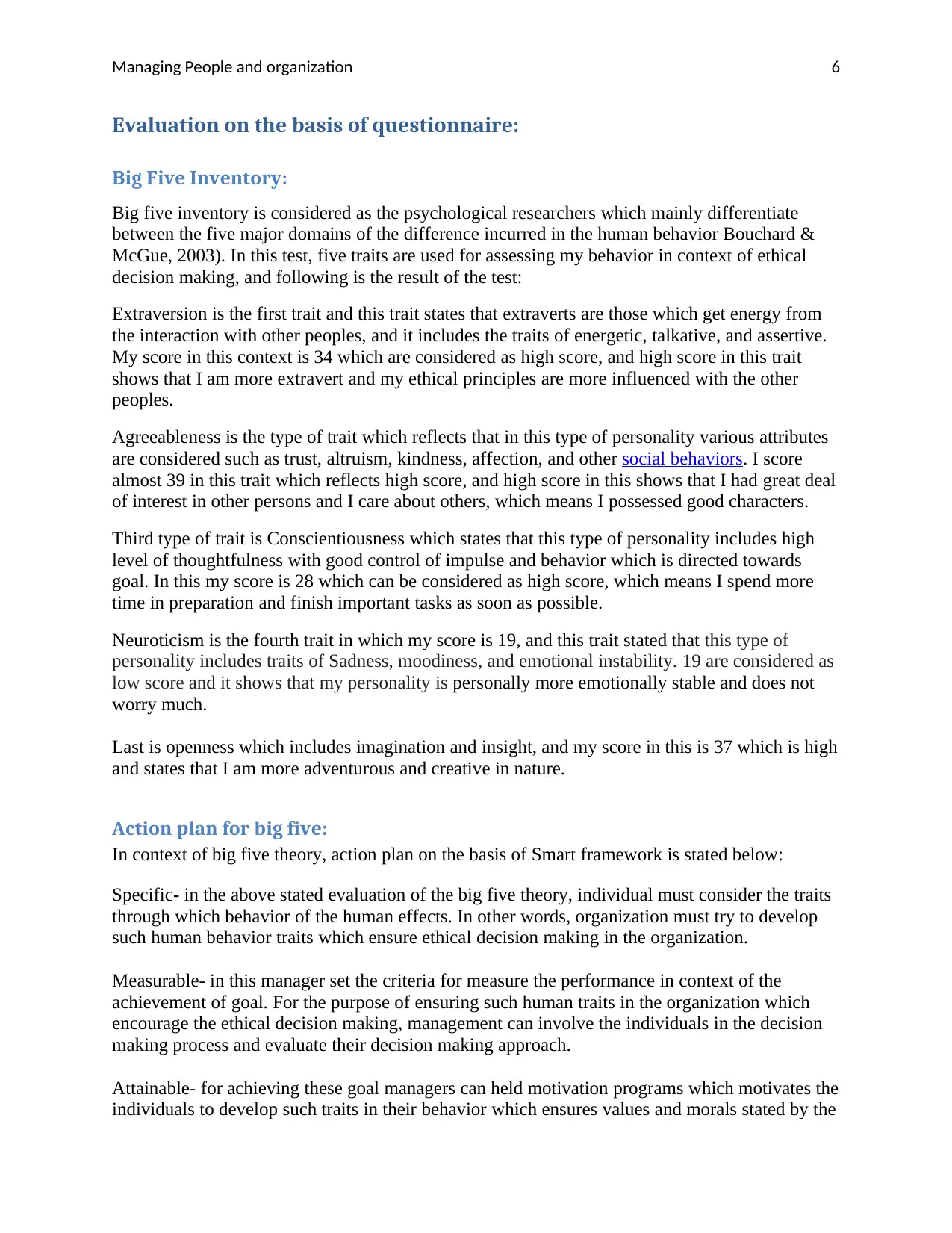
Managing People and organization 6
Evaluation on the basis of questionnaire:
Big Five Inventory:
Big five inventory is considered as the psychological researchers which mainly differentiate
between the five major domains of the difference incurred in the human behavior Bouchard &
McGue, 2003). In this test, five traits are used for assessing my behavior in context of ethical
decision making, and following is the result of the test:
Extraversion is the first trait and this trait states that extraverts are those which get energy from
the interaction with other peoples, and it includes the traits of energetic, talkative, and assertive.
My score in this context is 34 which are considered as high score, and high score in this trait
shows that I am more extravert and my ethical principles are more influenced with the other
peoples.
Agreeableness is the type of trait which reflects that in this type of personality various attributes
are considered such as trust, altruism, kindness, affection, and other social behaviors. I score
almost 39 in this trait which reflects high score, and high score in this shows that I had great deal
of interest in other persons and I care about others, which means I possessed good characters.
Third type of trait is Conscientiousness which states that this type of personality includes high
level of thoughtfulness with good control of impulse and behavior which is directed towards
goal. In this my score is 28 which can be considered as high score, which means I spend more
time in preparation and finish important tasks as soon as possible.
Neuroticism is the fourth trait in which my score is 19, and this trait stated that this type of
personality includes traits of Sadness, moodiness, and emotional instability. 19 are considered as
low score and it shows that my personality is personally more emotionally stable and does not
worry much.
Last is openness which includes imagination and insight, and my score in this is 37 which is high
and states that I am more adventurous and creative in nature.
Action plan for big five:
In context of big five theory, action plan on the basis of Smart framework is stated below:
Specific- in the above stated evaluation of the big five theory, individual must consider the traits
through which behavior of the human effects. In other words, organization must try to develop
such human behavior traits which ensure ethical decision making in the organization.
Measurable- in this manager set the criteria for measure the performance in context of the
achievement of goal. For the purpose of ensuring such human traits in the organization which
encourage the ethical decision making, management can involve the individuals in the decision
making process and evaluate their decision making approach.
Attainable- for achieving these goal managers can held motivation programs which motivates the
individuals to develop such traits in their behavior which ensures values and morals stated by the
Evaluation on the basis of questionnaire:
Big Five Inventory:
Big five inventory is considered as the psychological researchers which mainly differentiate
between the five major domains of the difference incurred in the human behavior Bouchard &
McGue, 2003). In this test, five traits are used for assessing my behavior in context of ethical
decision making, and following is the result of the test:
Extraversion is the first trait and this trait states that extraverts are those which get energy from
the interaction with other peoples, and it includes the traits of energetic, talkative, and assertive.
My score in this context is 34 which are considered as high score, and high score in this trait
shows that I am more extravert and my ethical principles are more influenced with the other
peoples.
Agreeableness is the type of trait which reflects that in this type of personality various attributes
are considered such as trust, altruism, kindness, affection, and other social behaviors. I score
almost 39 in this trait which reflects high score, and high score in this shows that I had great deal
of interest in other persons and I care about others, which means I possessed good characters.
Third type of trait is Conscientiousness which states that this type of personality includes high
level of thoughtfulness with good control of impulse and behavior which is directed towards
goal. In this my score is 28 which can be considered as high score, which means I spend more
time in preparation and finish important tasks as soon as possible.
Neuroticism is the fourth trait in which my score is 19, and this trait stated that this type of
personality includes traits of Sadness, moodiness, and emotional instability. 19 are considered as
low score and it shows that my personality is personally more emotionally stable and does not
worry much.
Last is openness which includes imagination and insight, and my score in this is 37 which is high
and states that I am more adventurous and creative in nature.
Action plan for big five:
In context of big five theory, action plan on the basis of Smart framework is stated below:
Specific- in the above stated evaluation of the big five theory, individual must consider the traits
through which behavior of the human effects. In other words, organization must try to develop
such human behavior traits which ensure ethical decision making in the organization.
Measurable- in this manager set the criteria for measure the performance in context of the
achievement of goal. For the purpose of ensuring such human traits in the organization which
encourage the ethical decision making, management can involve the individuals in the decision
making process and evaluate their decision making approach.
Attainable- for achieving these goal managers can held motivation programs which motivates the
individuals to develop such traits in their behavior which ensures values and morals stated by the
⊘ This is a preview!⊘
Do you want full access?
Subscribe today to unlock all pages.

Trusted by 1+ million students worldwide
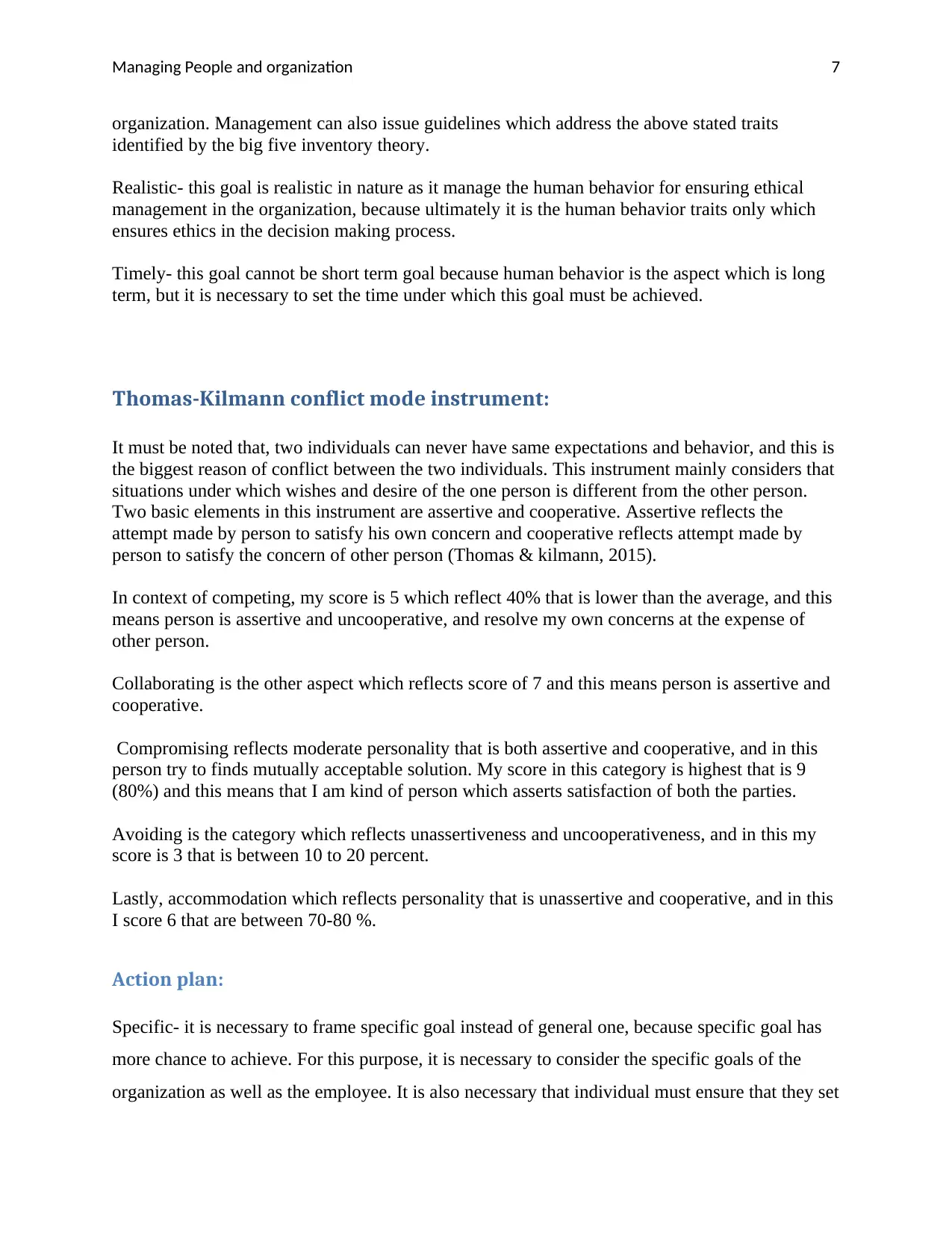
Managing People and organization 7
organization. Management can also issue guidelines which address the above stated traits
identified by the big five inventory theory.
Realistic- this goal is realistic in nature as it manage the human behavior for ensuring ethical
management in the organization, because ultimately it is the human behavior traits only which
ensures ethics in the decision making process.
Timely- this goal cannot be short term goal because human behavior is the aspect which is long
term, but it is necessary to set the time under which this goal must be achieved.
Thomas-Kilmann conflict mode instrument:
It must be noted that, two individuals can never have same expectations and behavior, and this is
the biggest reason of conflict between the two individuals. This instrument mainly considers that
situations under which wishes and desire of the one person is different from the other person.
Two basic elements in this instrument are assertive and cooperative. Assertive reflects the
attempt made by person to satisfy his own concern and cooperative reflects attempt made by
person to satisfy the concern of other person (Thomas & kilmann, 2015).
In context of competing, my score is 5 which reflect 40% that is lower than the average, and this
means person is assertive and uncooperative, and resolve my own concerns at the expense of
other person.
Collaborating is the other aspect which reflects score of 7 and this means person is assertive and
cooperative.
Compromising reflects moderate personality that is both assertive and cooperative, and in this
person try to finds mutually acceptable solution. My score in this category is highest that is 9
(80%) and this means that I am kind of person which asserts satisfaction of both the parties.
Avoiding is the category which reflects unassertiveness and uncooperativeness, and in this my
score is 3 that is between 10 to 20 percent.
Lastly, accommodation which reflects personality that is unassertive and cooperative, and in this
I score 6 that are between 70-80 %.
Action plan:
Specific- it is necessary to frame specific goal instead of general one, because specific goal has
more chance to achieve. For this purpose, it is necessary to consider the specific goals of the
organization as well as the employee. It is also necessary that individual must ensure that they set
organization. Management can also issue guidelines which address the above stated traits
identified by the big five inventory theory.
Realistic- this goal is realistic in nature as it manage the human behavior for ensuring ethical
management in the organization, because ultimately it is the human behavior traits only which
ensures ethics in the decision making process.
Timely- this goal cannot be short term goal because human behavior is the aspect which is long
term, but it is necessary to set the time under which this goal must be achieved.
Thomas-Kilmann conflict mode instrument:
It must be noted that, two individuals can never have same expectations and behavior, and this is
the biggest reason of conflict between the two individuals. This instrument mainly considers that
situations under which wishes and desire of the one person is different from the other person.
Two basic elements in this instrument are assertive and cooperative. Assertive reflects the
attempt made by person to satisfy his own concern and cooperative reflects attempt made by
person to satisfy the concern of other person (Thomas & kilmann, 2015).
In context of competing, my score is 5 which reflect 40% that is lower than the average, and this
means person is assertive and uncooperative, and resolve my own concerns at the expense of
other person.
Collaborating is the other aspect which reflects score of 7 and this means person is assertive and
cooperative.
Compromising reflects moderate personality that is both assertive and cooperative, and in this
person try to finds mutually acceptable solution. My score in this category is highest that is 9
(80%) and this means that I am kind of person which asserts satisfaction of both the parties.
Avoiding is the category which reflects unassertiveness and uncooperativeness, and in this my
score is 3 that is between 10 to 20 percent.
Lastly, accommodation which reflects personality that is unassertive and cooperative, and in this
I score 6 that are between 70-80 %.
Action plan:
Specific- it is necessary to frame specific goal instead of general one, because specific goal has
more chance to achieve. For this purpose, it is necessary to consider the specific goals of the
organization as well as the employee. It is also necessary that individual must ensure that they set
Paraphrase This Document
Need a fresh take? Get an instant paraphrase of this document with our AI Paraphraser
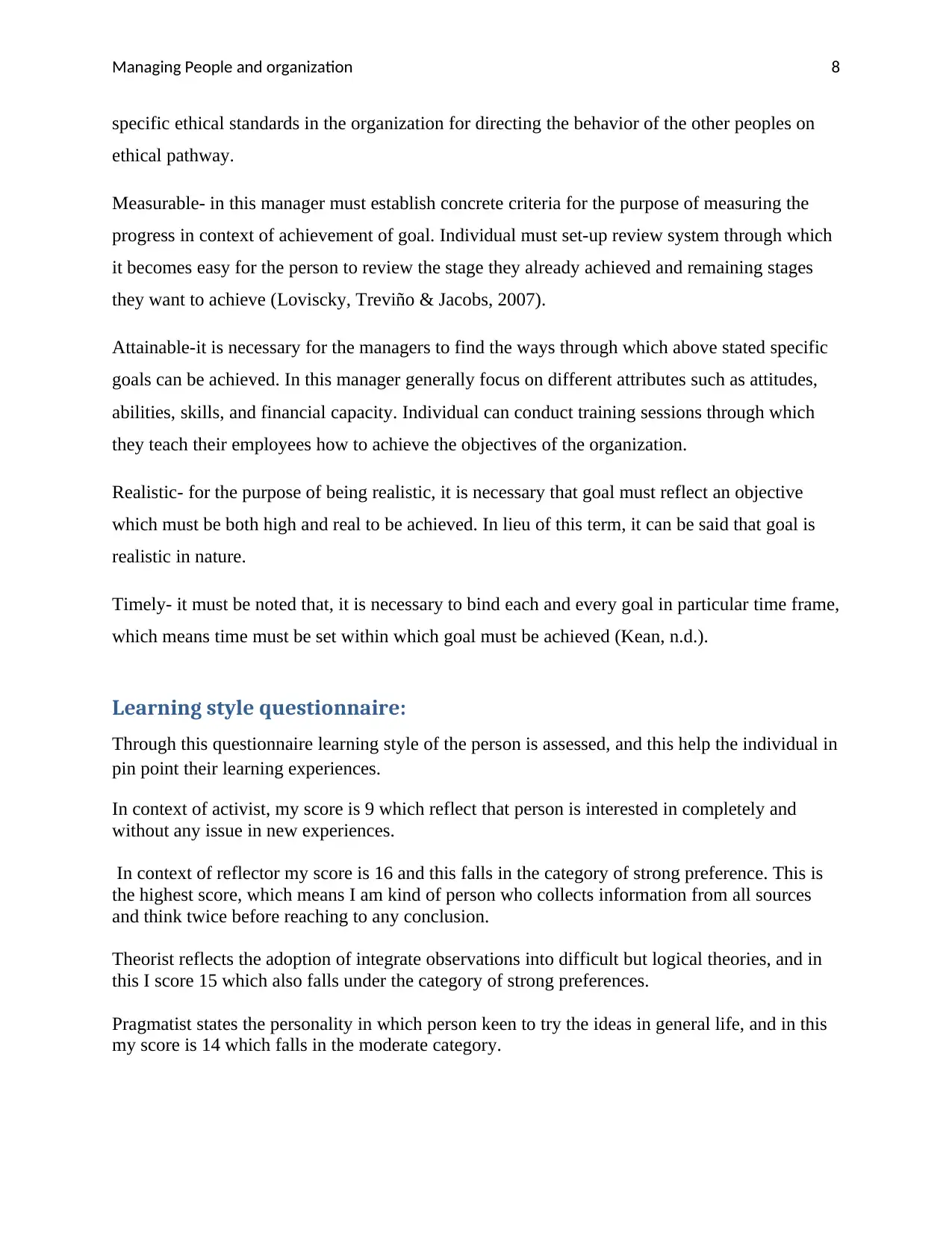
Managing People and organization 8
specific ethical standards in the organization for directing the behavior of the other peoples on
ethical pathway.
Measurable- in this manager must establish concrete criteria for the purpose of measuring the
progress in context of achievement of goal. Individual must set-up review system through which
it becomes easy for the person to review the stage they already achieved and remaining stages
they want to achieve (Loviscky, Treviño & Jacobs, 2007).
Attainable-it is necessary for the managers to find the ways through which above stated specific
goals can be achieved. In this manager generally focus on different attributes such as attitudes,
abilities, skills, and financial capacity. Individual can conduct training sessions through which
they teach their employees how to achieve the objectives of the organization.
Realistic- for the purpose of being realistic, it is necessary that goal must reflect an objective
which must be both high and real to be achieved. In lieu of this term, it can be said that goal is
realistic in nature.
Timely- it must be noted that, it is necessary to bind each and every goal in particular time frame,
which means time must be set within which goal must be achieved (Kean, n.d.).
Learning style questionnaire:
Through this questionnaire learning style of the person is assessed, and this help the individual in
pin point their learning experiences.
In context of activist, my score is 9 which reflect that person is interested in completely and
without any issue in new experiences.
In context of reflector my score is 16 and this falls in the category of strong preference. This is
the highest score, which means I am kind of person who collects information from all sources
and think twice before reaching to any conclusion.
Theorist reflects the adoption of integrate observations into difficult but logical theories, and in
this I score 15 which also falls under the category of strong preferences.
Pragmatist states the personality in which person keen to try the ideas in general life, and in this
my score is 14 which falls in the moderate category.
specific ethical standards in the organization for directing the behavior of the other peoples on
ethical pathway.
Measurable- in this manager must establish concrete criteria for the purpose of measuring the
progress in context of achievement of goal. Individual must set-up review system through which
it becomes easy for the person to review the stage they already achieved and remaining stages
they want to achieve (Loviscky, Treviño & Jacobs, 2007).
Attainable-it is necessary for the managers to find the ways through which above stated specific
goals can be achieved. In this manager generally focus on different attributes such as attitudes,
abilities, skills, and financial capacity. Individual can conduct training sessions through which
they teach their employees how to achieve the objectives of the organization.
Realistic- for the purpose of being realistic, it is necessary that goal must reflect an objective
which must be both high and real to be achieved. In lieu of this term, it can be said that goal is
realistic in nature.
Timely- it must be noted that, it is necessary to bind each and every goal in particular time frame,
which means time must be set within which goal must be achieved (Kean, n.d.).
Learning style questionnaire:
Through this questionnaire learning style of the person is assessed, and this help the individual in
pin point their learning experiences.
In context of activist, my score is 9 which reflect that person is interested in completely and
without any issue in new experiences.
In context of reflector my score is 16 and this falls in the category of strong preference. This is
the highest score, which means I am kind of person who collects information from all sources
and think twice before reaching to any conclusion.
Theorist reflects the adoption of integrate observations into difficult but logical theories, and in
this I score 15 which also falls under the category of strong preferences.
Pragmatist states the personality in which person keen to try the ideas in general life, and in this
my score is 14 which falls in the moderate category.
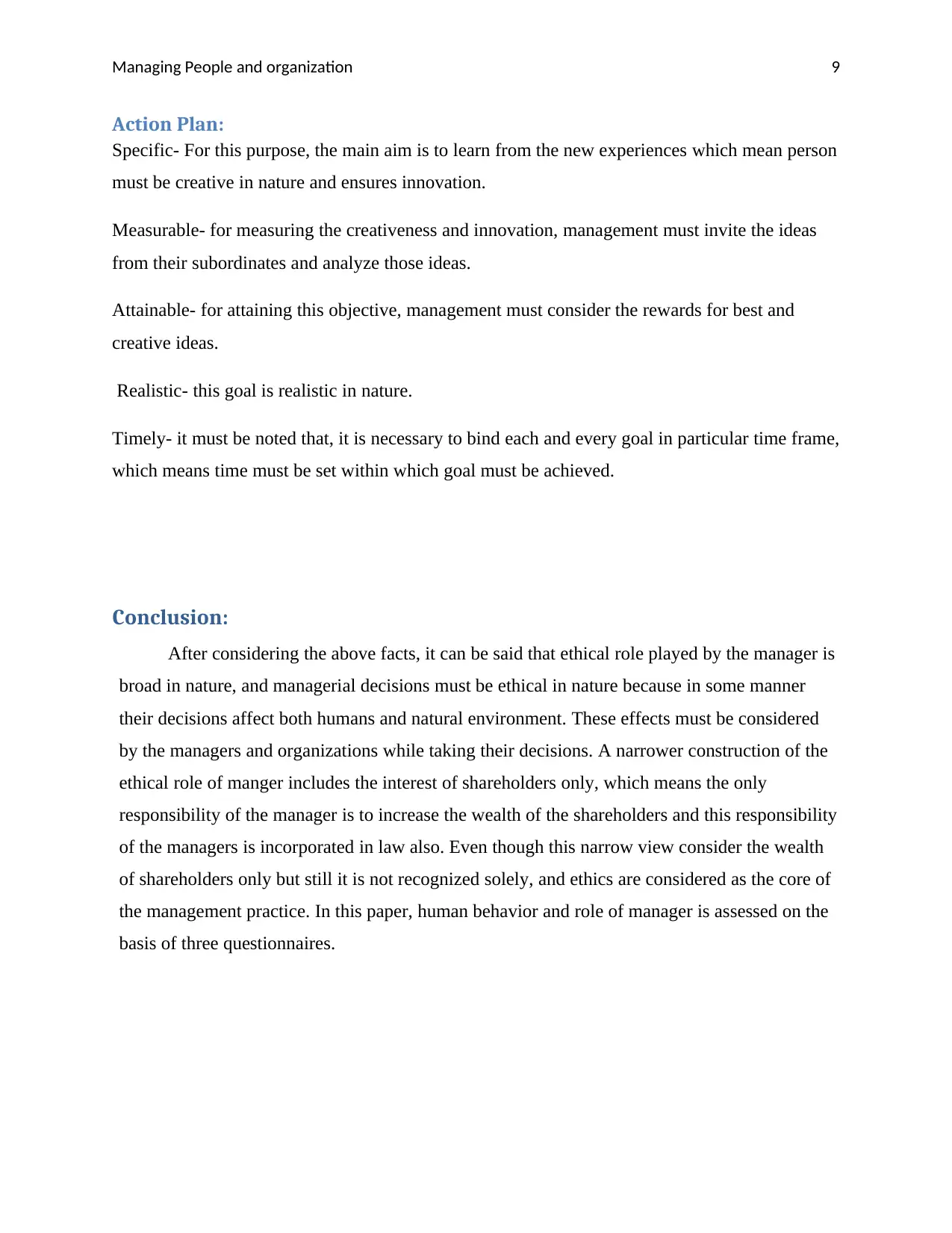
Managing People and organization 9
Action Plan:
Specific- For this purpose, the main aim is to learn from the new experiences which mean person
must be creative in nature and ensures innovation.
Measurable- for measuring the creativeness and innovation, management must invite the ideas
from their subordinates and analyze those ideas.
Attainable- for attaining this objective, management must consider the rewards for best and
creative ideas.
Realistic- this goal is realistic in nature.
Timely- it must be noted that, it is necessary to bind each and every goal in particular time frame,
which means time must be set within which goal must be achieved.
Conclusion:
After considering the above facts, it can be said that ethical role played by the manager is
broad in nature, and managerial decisions must be ethical in nature because in some manner
their decisions affect both humans and natural environment. These effects must be considered
by the managers and organizations while taking their decisions. A narrower construction of the
ethical role of manger includes the interest of shareholders only, which means the only
responsibility of the manager is to increase the wealth of the shareholders and this responsibility
of the managers is incorporated in law also. Even though this narrow view consider the wealth
of shareholders only but still it is not recognized solely, and ethics are considered as the core of
the management practice. In this paper, human behavior and role of manager is assessed on the
basis of three questionnaires.
Action Plan:
Specific- For this purpose, the main aim is to learn from the new experiences which mean person
must be creative in nature and ensures innovation.
Measurable- for measuring the creativeness and innovation, management must invite the ideas
from their subordinates and analyze those ideas.
Attainable- for attaining this objective, management must consider the rewards for best and
creative ideas.
Realistic- this goal is realistic in nature.
Timely- it must be noted that, it is necessary to bind each and every goal in particular time frame,
which means time must be set within which goal must be achieved.
Conclusion:
After considering the above facts, it can be said that ethical role played by the manager is
broad in nature, and managerial decisions must be ethical in nature because in some manner
their decisions affect both humans and natural environment. These effects must be considered
by the managers and organizations while taking their decisions. A narrower construction of the
ethical role of manger includes the interest of shareholders only, which means the only
responsibility of the manager is to increase the wealth of the shareholders and this responsibility
of the managers is incorporated in law also. Even though this narrow view consider the wealth
of shareholders only but still it is not recognized solely, and ethics are considered as the core of
the management practice. In this paper, human behavior and role of manager is assessed on the
basis of three questionnaires.
⊘ This is a preview!⊘
Do you want full access?
Subscribe today to unlock all pages.

Trusted by 1+ million students worldwide
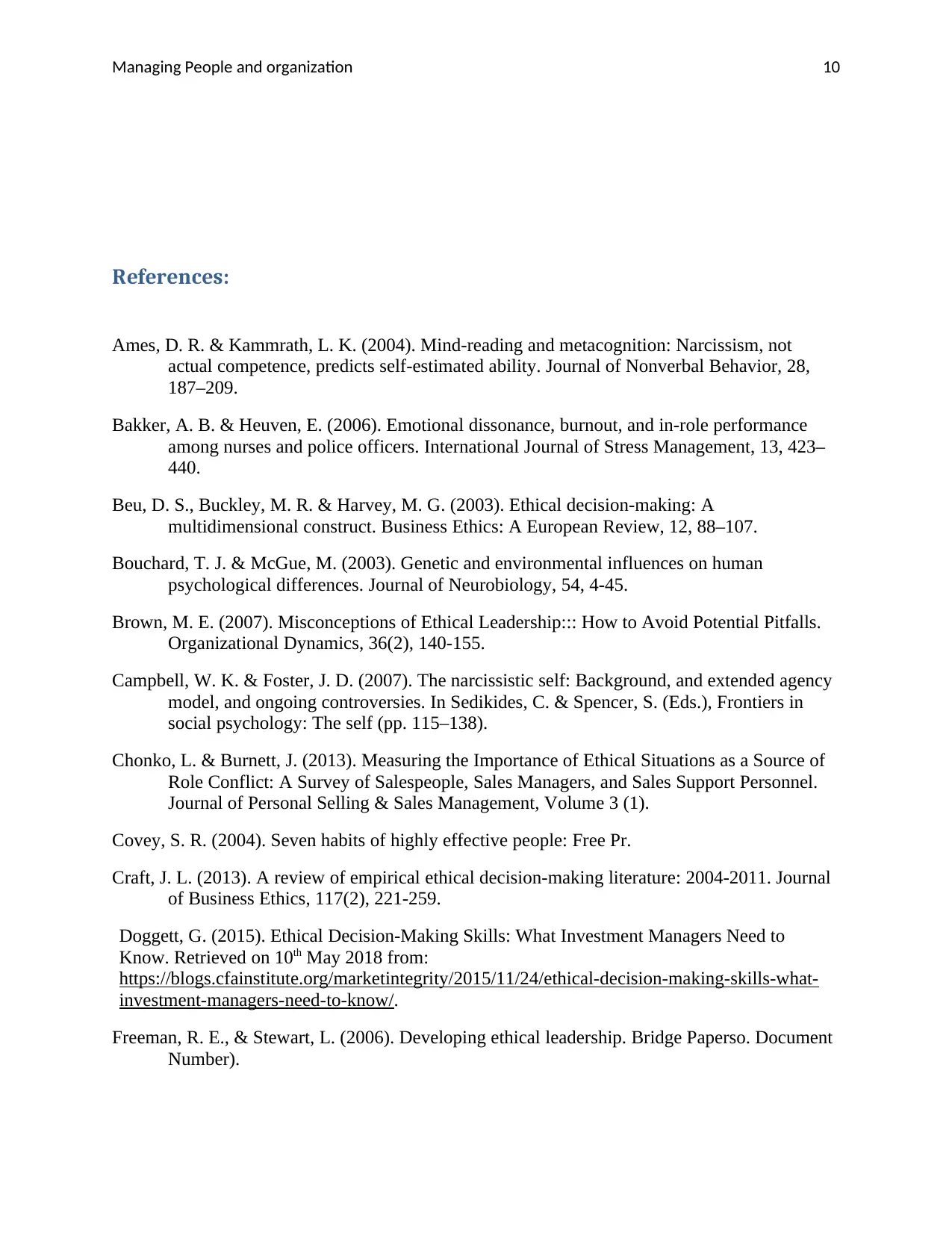
Managing People and organization 10
References:
Ames, D. R. & Kammrath, L. K. (2004). Mind-reading and metacognition: Narcissism, not
actual competence, predicts self-estimated ability. Journal of Nonverbal Behavior, 28,
187–209.
Bakker, A. B. & Heuven, E. (2006). Emotional dissonance, burnout, and in-role performance
among nurses and police officers. International Journal of Stress Management, 13, 423–
440.
Beu, D. S., Buckley, M. R. & Harvey, M. G. (2003). Ethical decision-making: A
multidimensional construct. Business Ethics: A European Review, 12, 88–107.
Bouchard, T. J. & McGue, M. (2003). Genetic and environmental influences on human
psychological differences. Journal of Neurobiology, 54, 4-45.
Brown, M. E. (2007). Misconceptions of Ethical Leadership::: How to Avoid Potential Pitfalls.
Organizational Dynamics, 36(2), 140-155.
Campbell, W. K. & Foster, J. D. (2007). The narcissistic self: Background, and extended agency
model, and ongoing controversies. In Sedikides, C. & Spencer, S. (Eds.), Frontiers in
social psychology: The self (pp. 115–138).
Chonko, L. & Burnett, J. (2013). Measuring the Importance of Ethical Situations as a Source of
Role Conflict: A Survey of Salespeople, Sales Managers, and Sales Support Personnel.
Journal of Personal Selling & Sales Management, Volume 3 (1).
Covey, S. R. (2004). Seven habits of highly effective people: Free Pr.
Craft, J. L. (2013). A review of empirical ethical decision-making literature: 2004-2011. Journal
of Business Ethics, 117(2), 221-259.
Doggett, G. (2015). Ethical Decision-Making Skills: What Investment Managers Need to
Know. Retrieved on 10th May 2018 from:
https://blogs.cfainstitute.org/marketintegrity/2015/11/24/ethical-decision-making-skills-what-
investment-managers-need-to-know/.
Freeman, R. E., & Stewart, L. (2006). Developing ethical leadership. Bridge Paperso. Document
Number).
References:
Ames, D. R. & Kammrath, L. K. (2004). Mind-reading and metacognition: Narcissism, not
actual competence, predicts self-estimated ability. Journal of Nonverbal Behavior, 28,
187–209.
Bakker, A. B. & Heuven, E. (2006). Emotional dissonance, burnout, and in-role performance
among nurses and police officers. International Journal of Stress Management, 13, 423–
440.
Beu, D. S., Buckley, M. R. & Harvey, M. G. (2003). Ethical decision-making: A
multidimensional construct. Business Ethics: A European Review, 12, 88–107.
Bouchard, T. J. & McGue, M. (2003). Genetic and environmental influences on human
psychological differences. Journal of Neurobiology, 54, 4-45.
Brown, M. E. (2007). Misconceptions of Ethical Leadership::: How to Avoid Potential Pitfalls.
Organizational Dynamics, 36(2), 140-155.
Campbell, W. K. & Foster, J. D. (2007). The narcissistic self: Background, and extended agency
model, and ongoing controversies. In Sedikides, C. & Spencer, S. (Eds.), Frontiers in
social psychology: The self (pp. 115–138).
Chonko, L. & Burnett, J. (2013). Measuring the Importance of Ethical Situations as a Source of
Role Conflict: A Survey of Salespeople, Sales Managers, and Sales Support Personnel.
Journal of Personal Selling & Sales Management, Volume 3 (1).
Covey, S. R. (2004). Seven habits of highly effective people: Free Pr.
Craft, J. L. (2013). A review of empirical ethical decision-making literature: 2004-2011. Journal
of Business Ethics, 117(2), 221-259.
Doggett, G. (2015). Ethical Decision-Making Skills: What Investment Managers Need to
Know. Retrieved on 10th May 2018 from:
https://blogs.cfainstitute.org/marketintegrity/2015/11/24/ethical-decision-making-skills-what-
investment-managers-need-to-know/.
Freeman, R. E., & Stewart, L. (2006). Developing ethical leadership. Bridge Paperso. Document
Number).
Paraphrase This Document
Need a fresh take? Get an instant paraphrase of this document with our AI Paraphraser
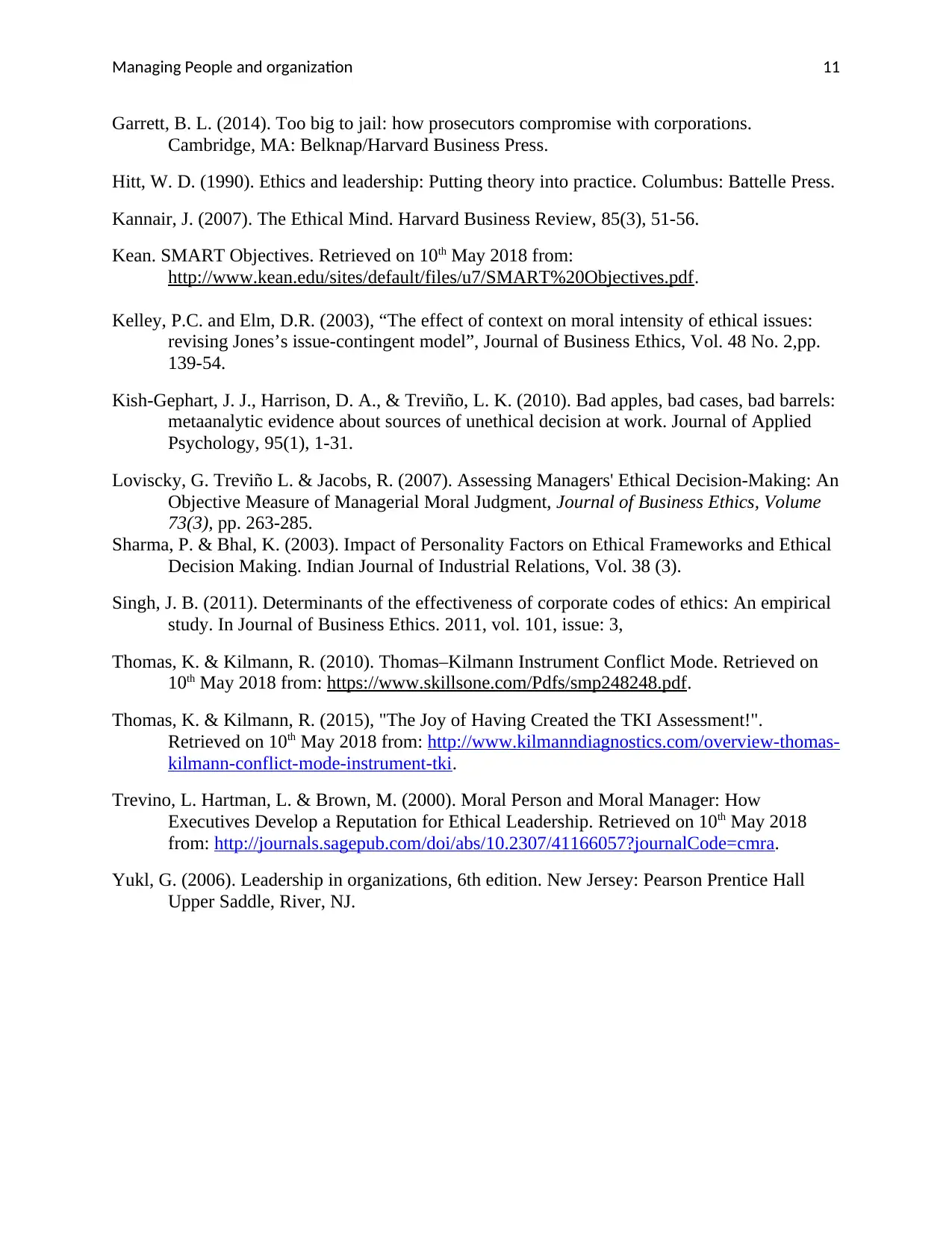
Managing People and organization 11
Garrett, B. L. (2014). Too big to jail: how prosecutors compromise with corporations.
Cambridge, MA: Belknap/Harvard Business Press.
Hitt, W. D. (1990). Ethics and leadership: Putting theory into practice. Columbus: Battelle Press.
Kannair, J. (2007). The Ethical Mind. Harvard Business Review, 85(3), 51-56.
Kean. SMART Objectives. Retrieved on 10th May 2018 from:
http://www.kean.edu/sites/default/files/u7/SMART%20Objectives.pdf.
Kelley, P.C. and Elm, D.R. (2003), “The effect of context on moral intensity of ethical issues:
revising Jones’s issue-contingent model”, Journal of Business Ethics, Vol. 48 No. 2,pp.
139-54.
Kish-Gephart, J. J., Harrison, D. A., & Treviño, L. K. (2010). Bad apples, bad cases, bad barrels:
metaanalytic evidence about sources of unethical decision at work. Journal of Applied
Psychology, 95(1), 1-31.
Loviscky, G. Treviño L. & Jacobs, R. (2007). Assessing Managers' Ethical Decision-Making: An
Objective Measure of Managerial Moral Judgment, Journal of Business Ethics, Volume
73(3), pp. 263-285.
Sharma, P. & Bhal, K. (2003). Impact of Personality Factors on Ethical Frameworks and Ethical
Decision Making. Indian Journal of Industrial Relations, Vol. 38 (3).
Singh, J. B. (2011). Determinants of the effectiveness of corporate codes of ethics: An empirical
study. In Journal of Business Ethics. 2011, vol. 101, issue: 3,
Thomas, K. & Kilmann, R. (2010). Thomas–Kilmann Instrument Conflict Mode. Retrieved on
10th May 2018 from: https://www.skillsone.com/Pdfs/smp248248.pdf.
Thomas, K. & Kilmann, R. (2015), "The Joy of Having Created the TKI Assessment!".
Retrieved on 10th May 2018 from: http://www.kilmanndiagnostics.com/overview-thomas-
kilmann-conflict-mode-instrument-tki.
Trevino, L. Hartman, L. & Brown, M. (2000). Moral Person and Moral Manager: How
Executives Develop a Reputation for Ethical Leadership. Retrieved on 10th May 2018
from: http://journals.sagepub.com/doi/abs/10.2307/41166057?journalCode=cmra.
Yukl, G. (2006). Leadership in organizations, 6th edition. New Jersey: Pearson Prentice Hall
Upper Saddle, River, NJ.
Garrett, B. L. (2014). Too big to jail: how prosecutors compromise with corporations.
Cambridge, MA: Belknap/Harvard Business Press.
Hitt, W. D. (1990). Ethics and leadership: Putting theory into practice. Columbus: Battelle Press.
Kannair, J. (2007). The Ethical Mind. Harvard Business Review, 85(3), 51-56.
Kean. SMART Objectives. Retrieved on 10th May 2018 from:
http://www.kean.edu/sites/default/files/u7/SMART%20Objectives.pdf.
Kelley, P.C. and Elm, D.R. (2003), “The effect of context on moral intensity of ethical issues:
revising Jones’s issue-contingent model”, Journal of Business Ethics, Vol. 48 No. 2,pp.
139-54.
Kish-Gephart, J. J., Harrison, D. A., & Treviño, L. K. (2010). Bad apples, bad cases, bad barrels:
metaanalytic evidence about sources of unethical decision at work. Journal of Applied
Psychology, 95(1), 1-31.
Loviscky, G. Treviño L. & Jacobs, R. (2007). Assessing Managers' Ethical Decision-Making: An
Objective Measure of Managerial Moral Judgment, Journal of Business Ethics, Volume
73(3), pp. 263-285.
Sharma, P. & Bhal, K. (2003). Impact of Personality Factors on Ethical Frameworks and Ethical
Decision Making. Indian Journal of Industrial Relations, Vol. 38 (3).
Singh, J. B. (2011). Determinants of the effectiveness of corporate codes of ethics: An empirical
study. In Journal of Business Ethics. 2011, vol. 101, issue: 3,
Thomas, K. & Kilmann, R. (2010). Thomas–Kilmann Instrument Conflict Mode. Retrieved on
10th May 2018 from: https://www.skillsone.com/Pdfs/smp248248.pdf.
Thomas, K. & Kilmann, R. (2015), "The Joy of Having Created the TKI Assessment!".
Retrieved on 10th May 2018 from: http://www.kilmanndiagnostics.com/overview-thomas-
kilmann-conflict-mode-instrument-tki.
Trevino, L. Hartman, L. & Brown, M. (2000). Moral Person and Moral Manager: How
Executives Develop a Reputation for Ethical Leadership. Retrieved on 10th May 2018
from: http://journals.sagepub.com/doi/abs/10.2307/41166057?journalCode=cmra.
Yukl, G. (2006). Leadership in organizations, 6th edition. New Jersey: Pearson Prentice Hall
Upper Saddle, River, NJ.
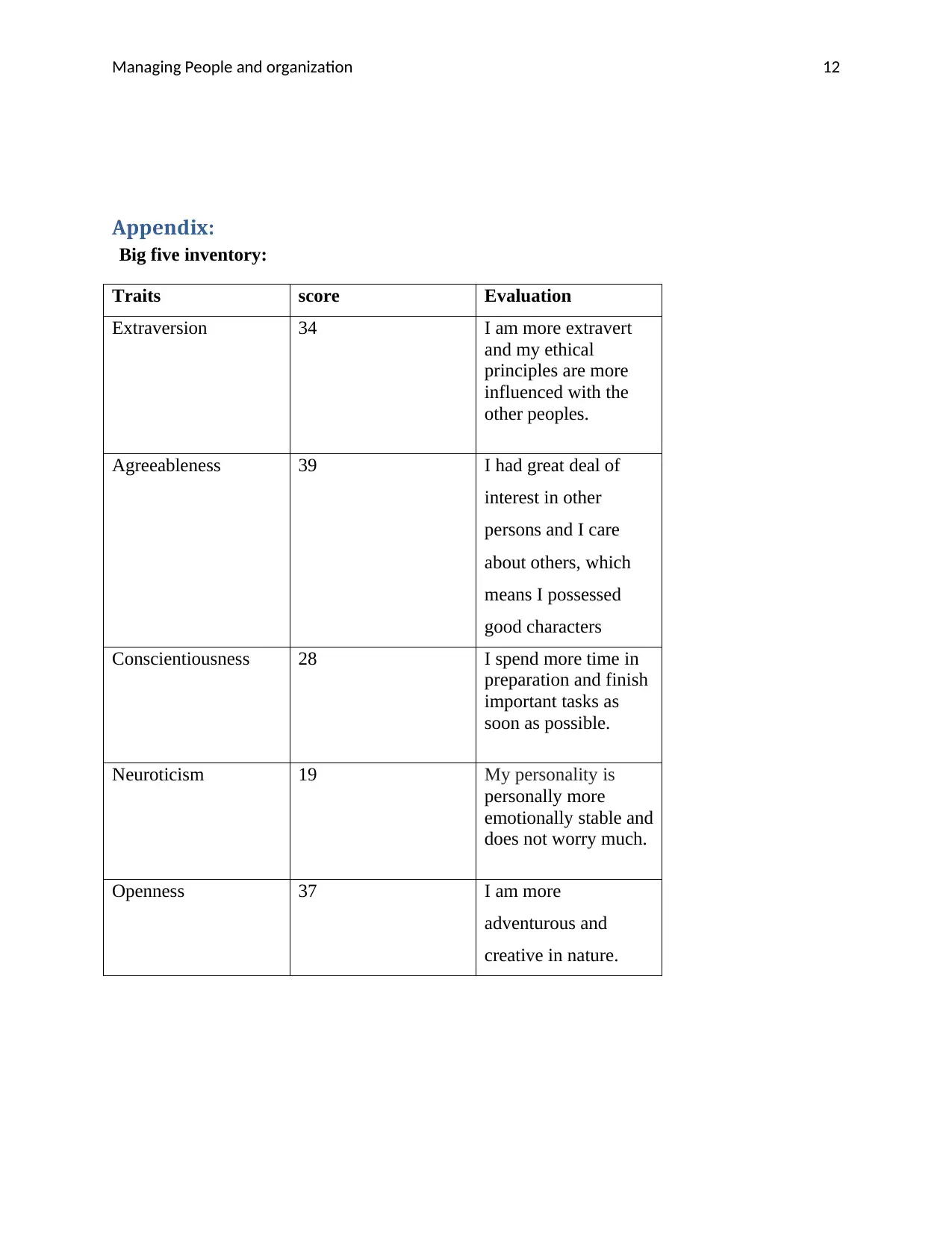
Managing People and organization 12
Appendix:
Big five inventory:
Traits score Evaluation
Extraversion 34 I am more extravert
and my ethical
principles are more
influenced with the
other peoples.
Agreeableness 39 I had great deal of
interest in other
persons and I care
about others, which
means I possessed
good characters
Conscientiousness 28 I spend more time in
preparation and finish
important tasks as
soon as possible.
Neuroticism 19 My personality is
personally more
emotionally stable and
does not worry much.
Openness 37 I am more
adventurous and
creative in nature.
Appendix:
Big five inventory:
Traits score Evaluation
Extraversion 34 I am more extravert
and my ethical
principles are more
influenced with the
other peoples.
Agreeableness 39 I had great deal of
interest in other
persons and I care
about others, which
means I possessed
good characters
Conscientiousness 28 I spend more time in
preparation and finish
important tasks as
soon as possible.
Neuroticism 19 My personality is
personally more
emotionally stable and
does not worry much.
Openness 37 I am more
adventurous and
creative in nature.
⊘ This is a preview!⊘
Do you want full access?
Subscribe today to unlock all pages.

Trusted by 1+ million students worldwide
1 out of 16
Related Documents
Your All-in-One AI-Powered Toolkit for Academic Success.
+13062052269
info@desklib.com
Available 24*7 on WhatsApp / Email
![[object Object]](/_next/static/media/star-bottom.7253800d.svg)
Unlock your academic potential
Copyright © 2020–2026 A2Z Services. All Rights Reserved. Developed and managed by ZUCOL.





